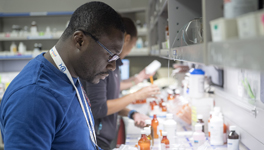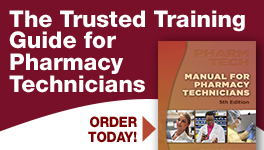Primary Intended Outcome(s):
- Create an exceptional experience for patients prior to their elective surgery by providing an opportunity for patients to ask questions and receive education re: their medications.
- Optimize medication use safety by helping to navigate management of anticoagulation therapy decisions in the peri-operative period.
- Assure an accurate and complete medication history is obtained prior to surgery.
Associated with the following PPMI Recommendation or ASHP Strategic Plan Goals:
- Initiation of medication reconciliation including obtaining and documenting patients' medication information for pharmacists' review.
- Reviewing patient charts to identify medication allergies that require pharmacist follow up.
- Scheduling patient outpatient clinic drug therapy management visits.
- Criteria‐based screening of medical records to identify patients who may require pharmacist intervention.
- Preparing clinical monitoring information (e.g., International Normalized Ratios) for pharmacist review.
- Conducting aspects of quality improvement programs.
- Managing pharmacy department information technology systems, including routine database management and billing systems.
Site Description:
Mission Hospital, the flagship hospital of Mission Health, has been committed to improving the health of the people of Western North Carolina since 1885. Based in Asheville, NC, Mission Hospital is a not-for-profit hospital that serves as the regional referral center for tertiary and quaternary care in western North Carolina and the surrounding region. Mission Hospital houses the region's only dedicated Level II trauma center and children's hospital. Mission Hospital is licensed for 795 beds and employs approximately 6,800 individuals; including more than 1,800 RNs. Mission Hospital is recognized as a national leader. Mission Hospital was ranked as one of the nation's Top 100 Hospitals by Truven Health Analytics for a record five consecutive years, and named as one of the "100 Great Hospitals in America" by Becker's Hospital Review. Though firmly rooted in western North Carolina, our learning and expertise is drawn from global resources, ensuring we're in tune with the very best health care standards the world has to offer. Our team strives to ensure the desired outcome for each and every patient without harm, without waste, and with a great experience. This relentless focus fuels our employees, our technology, our delivery methods, and the benchmarks that have helped us achieve world-class standards.
Advanced Role Description:
Pharmacy technicians initially conducted the medication histories only for the patients who would be seen by the pharmacist. Eventually, one of our hospitalists requested that pharmacy technicians assume the role of pre- surgical medication histories for all OBS/PreAdmin elective surgery patients who came through the Surgical- Anesthesia Teaching Unit. At this time, additional technicians were hired and the protocols were developed to guide this work, so that physicians and nurses could focus their time on different aspects of patient care needing to be performed prior to surgery. We have six certified pharmacy technicians who conduct pre-surgical medication histories for our elective surgery patients who are pre-admits or in an outpatient/observation status. This group of technicians completes approximately 800 medication histories per month. In addition to the medication histories, the technicians provide the patients with protocol-driven hold instructions for NSAID therapy, supplements, aspirin, and anticoagulant hold times, as well as facilitating referral to a clinical pharmacist for bridge therapy assessment/recommendations/management with provider support. All the technician medication histories are reviewed/checked by an outpatient clinical pharmacist. Many patients see the pharmacist for a medication management or an anticoagulant pre-op teaching visit prior to surgery at Mission Hospital.
Revenue & Expense Parameters (abbreviated financials):
- Direct costs include salary and benefits for the pharmacy technicians as well as the clinical pharmacist oversight. Additionally, the technicians and pharmacists' workstations are outfitted with computers, phones, printers, EMR access, office supplies, etc. There is no revenue associated with the phone medication histories. The approximate cost savings are documented and tracked in an internal database, and average $60,000 per month. The quantity and quality of these interventions are reported with our department's monthly dashboard to the C-suite/administration.
Training and/or Education Requirements:
Our pharmacy technicians must complete a patient case during their interview process, so we have a sense of their clinical background prior to hire. Once the technician is hired, he/she must maintain national certification and registration with NC Board of Pharmacy. Additionally, we provide four-weeks of on-the-job training and have developed protocols to guide the content and process of this work. Performance metrics are tracked and feedback is provided in real-time regarding the quality of work, and performance is reviewed at least twice per year. Competencies are assessed initially and at least every three years.
Outcome Measures:
Short-term results:
- We have data that demonstrates that pharmacy technicians' medication history obtainment process provides medication lists with accuracy superior to that of medication histories performed by other disciplines (RN, MD). We also have data to show that patients who speak with a pharmacy technician are more likely to receive appropriate hold time instructions for NSAIDS and supplements, as well as guideline-based bridge therapy assessment/recommendations from the clinical pharmacist.
Long-term goals:
- Expand the medication history service to all patients receiving surgery/procedures at a Mission Health facility. Assure a consistent process/procedure is in place for every medication history obtained at a Mission facility.
Lessons Learned:
- Certified Pharmacy Technicians (CPhTs) are instrumental in collecting complete medication histories for elective surgery patients so that patients receive the correct medications during admission and medication errors are eliminated. CPhTs also ensure that more complex patients are reviewed by a clinical. Utilization of CPhTs enables more patients to receive focused pharmacy services during the elective surgery experience.


